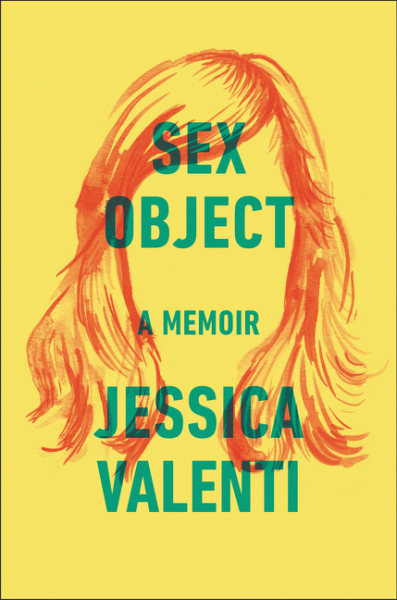 “Who would I be if I didn’t live in a world that hated women?”
“Who would I be if I didn’t live in a world that hated women?”
On my most recent visit to the library, I stopped by the new releases section, picking up Sex Object: A Memoir, the new, thought-provoking memoir by Jessica Valenti, the feminist author, Guardian US columnist, and Feministing.com co-founder.
In Sex Object, Valenti examines her life-long sexual objectification—by both men and herself—and how that experience shaped who she became. Jumping from her childhood in Queens, New York to her adolescence traveling the streets and subways of Manhattan to her early adulthood finding her way in Brooklyn, Valenti depicts years of negotiating power with boys and men and making decisions that left her simultaneously wounded and stronger. She reflects on the inheritance of sexism and abuse, her adoption of the role of a sexual being without yet understanding who or what she needed, and the ways men disrespect girls and women with abandon. The result is a raw, shocking commentary on relationships, self-worth, and society today.
Valenti has written several other books—about feminism, parenting, sexuality, and sexual power—but this is the first time I read anything by her. I found her style engrossing; her writing is efficient and effective, drawing you in quickly. She uses her life’s experiences to consider the ways men have mistreated her and her examples are memorable: she writes about a date rape she can’t quite admit is rape (which is disturbing yet not surprising considering the way rape victims are treated) to online insults from readers of her columns (a selection of which are shared in the back of the book) to the numerous times men exposed themselves to her as she commuted on New York City subways as a teen (I can’t tell what’s worse: that it happened so often or that it started when she was so young). With a candor that feels both conspiratorial and vulnerable, Valenti writes about drug use and boyfriends who cheated, the challenge of letting go of a bad boyfriend, and failing out of college.
This isn’t an easy book to read; at one point, I had to walk away from it for a while, to give myself a break. The volume of negative occurrences in Valenti’s life is overwhelming—how can she have healthy relationships, I wondered?—but throughout each of Valenti’s tales, I sensed a growing sense of compassion and a desire for truth. That truth, she hypothesizes, may be hard but it is also what can initiate change. She writes:
…Feminism today feels like an unstoppable force of female agency and independence. Of positivity and possibility. Even our sad stories, of which there are many, have their takeaway moral lessons or silver lining that allows us to buck up, move on, keep working. This is not just a survival technique but an evangelizing strategy, and a good one at that. But maybe we’re doing ourselves a disservice by working so hard to move past what sexism has done to us rather than observe it for a while. Maybe it’s okay if we don’t want to be inspirational just this once.”
Maybe it’s okay if we don’t want to be inspirational just this once. Is that a call to be more honest? If so, Valenti has definitely embraced that in Sex Object, reflecting the 21st century world that a woman can run for President of the United States but feel unsafe walking down the street.
As the mother of a young girl, I, like Valenti, wonder how to raise my daughter to be strong, to be confident, to not let other voices decide who she is and who she wants to be. Valenti senses that dilemma as well, and, in one of the passages in the book that resonated that most with me, she writes:
A high school teacher once told me that identity is half what we tell ourselves and half what we tell other people about ourselves. But the missing piece he didn’t mention—the piece that holds so much weight, especially in the minds of young women and girls—is the stories that other people tell us about ourselves. Those narratives become the ones we shape ourselves into. They’re who we are, even if so much of it is performance.”
Just sit with this one for a while. I had to.
The first time I read this passage—and as I re-read it now—I remember every time I held myself back from something I wanted because of someone else’s judgement of me, of how I was shaped—for better and for worse—by someone’s narrative of me. It can hold you back, keep you down, and it can make you soar. The trick is listening to the stories that help you reach to the sky.
There’s so much truth in Sex Object, and it’s a good match for people—women especially—who want to reflect upon their own truth as it relates to sex, men, and sexism. Sex Object is a book I need to think about, marinate on, perhaps even re-read. I appreciate books that make me wrinkle my forehead in concentration and leave me wanting to read more on the topic.
At 205 pages, Sex Object is dip into big questions about sexual objectification and identity. I found myself wanting a deeper plunge into these issues, and I wish Valenti had circled back to the question she raises in her introduction—“Who would I be if I didn’t live in a world that hated women?”—thereby connecting her stories more directly to feminism today.
Recommendation: If you’re looking to foster discussion with friends about feminism, sexual dynamics, and being a woman in modern-day America, Sex Object is a good place to start that conversation. It would be great book club discussion, especially if it was paired with writings by other feminist, intersectional writers.
Rating: 3.5/5
